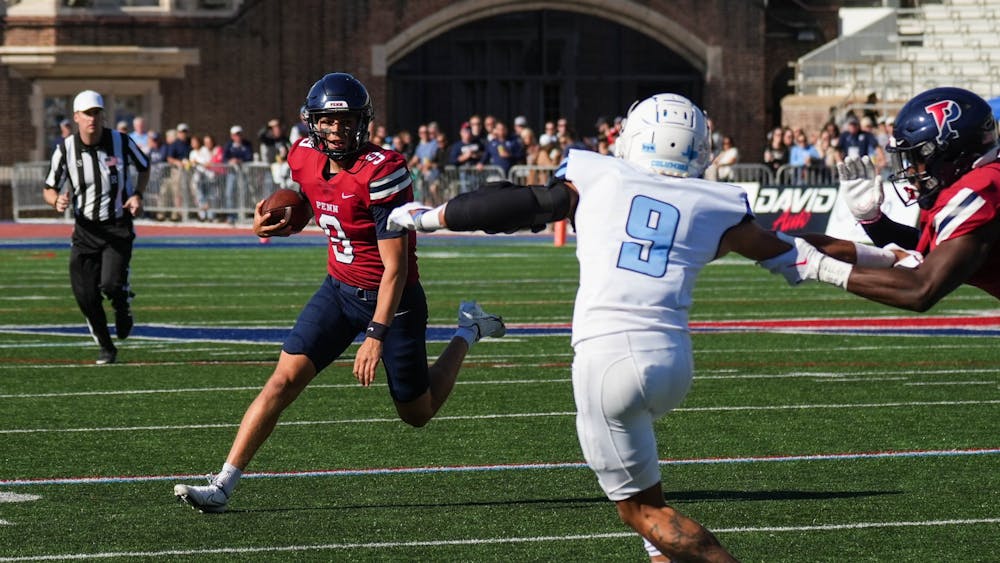
At the halfway point of the season, Penn football now sits at a perfect 5-0 record, and I have some atoning to do.
Prior to the season, I predicted that Penn would go 5-5 — a modest two-game improvement over last season’s dismal 3-7 output.
Well, barring a catastrophic collapse in the second half of the season, the Quakers are going to eclipse that total. And if this Saturday’s blowout victory over Columbia is any indication, they might surpass what my more optimistic colleagues predicted, and maybe — just maybe — have a shot at winning an Ivy title.
I said Penn would go 5-5 primarily because it felt like the offense needed another year to reach its fullest potential. New offensive coordinator Dan Swanstrom was just months into the job, and he was tasked with turning around an Ivy-worst offense and developing an attack centered around sophomore quarterback Aidan Sayin, who looked promising but was still very early in his trajectory.
While the offense isn’t the unit carrying the team this season, Swanstrom has devised a scheme that finally works around its sophomore signal-caller. In the five games Sayin played in 2021, the highest number of receivers he targeted in a single game was seven. This season, however, Sayin hasn’t thrown to fewer than eight receivers once, more often targeting nine or 10, as he did on Saturday.
The diversity in the receiving corps has been supplemented by shorter throws, as Sayin’s yards per completion has dropped by over a yard from last season. On Saturday, this trend continued, but Penn’s quarterback proved his deep ball abilities in the second quarter with a 45-yard strike up the middle for a touchdown past three Columbia defenders.
The receiver that caught the score was junior wideout Josh Casilli, who finished with a career-high 11 catches and 159 yards, cementing himself as a viable offensive weapon after three quiet weeks in which he and Sayin “miss[ed] each other by a slim margin,” according to Casilli.
The Quakers’ offense struggled through the first three games of the season, and, even on Saturday, there were still some missed throws and difficulty establishing the run. But though the 59-point explosion at Georgetown might’ve been due to the Hoyas’ lackluster defense, its performance against Columbia — without starting running back Trey Flowers — showed that the unit is able to compete in the Ivy League in a way it wasn’t able to last season.
I got a lot wrong in my season prediction, but there was one particular area where I was dead on: The only current Penn defensive player I mentioned by name was senior defensive back Kendren Smith, and on Saturday, he had what was easily the best performance of his career.
Smith forced a whopping three Columbia turnovers, stripping the ball away from the Lions on two separate occasions and undercutting Columbia quarterback Joe Green’s end zone throw to snag the second interception of his career.
The defensive back was not a part of much of the Quakers’ run last season — sidelined with an injury past Week 3 — and his return, along with a seeming improvement in all aspects of coordinator Bob Benson’s unit, has this team looking like an Ivy title contender.
Watching these first five games, it feels like all of the quarterbacks Penn has faced often can’t find any open targets or don’t have enough time in the pocket to wait for one to open up. The Quakers rank first in the Ivy League in defensive passing efficiency, with just 52.4% of opposing team’s throws resulting in completions.
On Saturday, Penn held Columbia’s starting quarterback to just five total completions on 21 throws, resulting in his benching for much of the second half.
In the run game, meanwhile, Penn’s defensive front last season ranked third-to-last in the Ivy League. This time, the Quakers have improved to third in the conference, marking a welcome growth for a unit that lost defensive lineman Prince Emili and linebacker Brian O’Neill after last season.
In all key aspects of the game, this team looks to have done a 180 from what it was last season, and, barring a dramatic end-of-season drought, the Quakers will finish well above .500. After this week, they might even rank in the top 25 in the FCS.
In terms of Ivy title contention, though, Penn still has Princeton, Harvard, and Yale left on the schedule. Three of Penn’s wins so far have been non-conference, and two have been against conference teams that look significantly worse than they were last season.
This group still has a lot to prove. But if the team keeps performing as harmoniously as it did on Saturday, there’s no question whether it can at least hang with the top Ivy contenders for the coveted conference championship.
MATTHEW FRANK is a Senior Sports Editor for The Daily Pennsylvanian and is a College junior from Miami studying English. He can be reached at frank@thedp.com.
The Daily Pennsylvanian is an independent, student-run newspaper. Please consider making a donation to support the coverage that shapes the University. Your generosity ensures a future of strong journalism at Penn.
Donate







